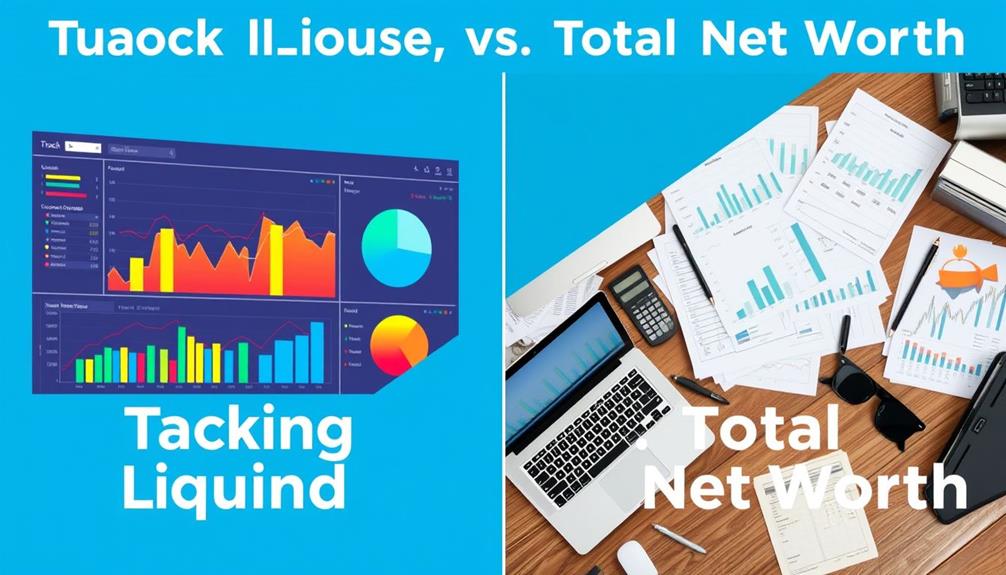Understanding liquid versus total net worth can be the key to revealing your wealth potential. Liquid net worth focuses on easily accessible assets like cash and stocks, while total net worth includes all of your assets, such as property and vehicles. High total net worth might mask liquidity issues, making it hard to manage emergencies or seize investment opportunities. By prioritizing a healthy balance of both metrics, you'll enhance your financial stability and growth. Knowing how to effectively manage these assets can propel you toward greater wealth. Stick around to discover strategies that can elevate your financial journey even further!
Key Takeaways
- Total net worth includes all assets, while liquid net worth focuses solely on cash and easily convertible investments.
- Liquid net worth is critical for short-term financial decisions and emergency readiness, ensuring accessible funds when needed.
- High total net worth may mask liquidity issues if wealth is tied up in non-liquid assets, impacting financial stability.
- Maintaining 5%-10% of total net worth in liquid assets enhances flexibility and readiness for investment opportunities.
- Effective expense management and income diversification can significantly boost both total and liquid net worth over time.
Understanding Net Worth
Understanding your net worth is fundamental for evaluating your financial health. In essence, your net worth is calculated by subtracting total liabilities from total assets. This gives you a snapshot of your overall net position at any given time.
Assets can include cash, investments, real estate, and vehicles, while liabilities encompass mortgages, loans, and credit card debts. By employing strategies such as creating a personal budget, you can better manage your assets and liabilities, ultimately improving your net worth.
When you calculate your net worth, you gain insight into your financial situation, helping you make smarter decisions about spending and investing. It's important to realize that a millionaire might've substantial assets but limited cash flow, indicating that net worth reflects your overall wealth rather than your immediate financial liquidity.
Tracking your net worth over time can reveal valuable trends, highlighting areas of growth and aspects needing improvement. By understanding your net worth, you're better equipped to prioritize your financial goals and strategies.
Exploring Liquid Net Worth

Liquidity is essential for steering through financial uncertainties, and that's where liquid net worth comes into play. Liquid net worth is calculated by subtracting your liabilities from your liquid assets, which include cash and investments that can easily be converted to cash, like stocks and bonds. This measurement gives you a clear picture of your immediate financial access, vital for emergencies or quick investments.
Investing in assets such as precious metals through a Gold IRA can also enhance your liquid net worth while providing a hedge against market volatility. Unlike total net worth, which includes nonliquid assets like real estate and vehicles, liquid net worth focuses solely on your cash and easily accessible assets. This often results in a lower figure compared to your total net worth, but it's incredibly important for short-term financial decision-making.
Aiming for a liquid asset allocation of 5%-10% of your total net worth can help you maintain sufficient liquidity while still investing in growth opportunities. Understanding your liquid net worth allows you to assess how well you can handle unexpected expenses, ensuring you're prepared for whatever life throws your way.
Prioritizing liquidity will empower you to make informed financial choices and build a more secure future.
Key Differences Explained

When it comes to evaluating your financial health, recognizing the key differences between liquid and total net worth is essential. Total net worth is the broad picture; it's calculated by subtracting your total liabilities from all your assets. This includes everything from real estate and vehicles to collectibles.
In contrast, liquid net worth focuses solely on cash or cash-equivalents available for immediate use, like savings or stocks. Understanding the implications of asset liquidity can also inform your investment decisions, such as the benefits of diversifying your portfolio with precious metals like gold.
One significant difference is that liquid net worth is typically much lower than total net worth. This discrepancy can create misleading perceptions about your financial health. While liquid assets are easily accessible, nonliquid assets, such as property, can take time to convert into cash.
To refine your understanding, the 80% valuation rule allows for partial inclusion of nonliquid assets in calculating liquid net worth, offering a clearer view of your financial liquidity.
Understanding these differences is vital for effective financial planning. By knowing both your total and liquid net worth, you can better assess your readiness for emergencies or investments, ensuring you have access to the funds you need when it matters most.
Importance of Each Metric

Evaluating your financial health requires recognizing the importance of both total and liquid net worth. Understanding these metrics is essential for achieving financial stability and guaranteeing you can save for retirement effectively. While total net worth gives you a broad view of your wealth, liquid net worth reveals your immediate cash availability for expenses and emergencies.
Here's a quick comparison to illustrate their significance:
| Metric | Importance |
|---|---|
| Total Net Worth | Reflects overall wealth, including assets |
| Liquid Net Worth | Indicates accessible funds for expenses |
| Financial Stability | Guarantees you can handle emergencies |
| Saving for Retirement | Helps in planning for future needs |
| Economic Downturn | Liquid assets are critical for maneuvering challenges |
A high total net worth might look impressive, but if most of it is tied up in non-liquid assets, you could face difficulties during emergencies. Tracking both metrics allows you to balance short-term needs with long-term wealth growth. By maintaining a healthy liquid net worth, you position yourself to seize opportunities and manage financial challenges more effectively.
Strategies to Increase Net Worth

To boost your net worth, start by managing your expenses more effectively and sticking to a budget.
Exploring ways to diversify your income—like picking up a side hustle or changing jobs—can also make a significant difference.
Consider leveraging your skills through freelance opportunities or exploring e-commerce options to enhance your financial situation.
Expense Management Techniques
Effective expense management is essential for boosting your net worth, as it allows you to maximize savings and invest wisely. By implementing smart expense management techniques, you can save money and enhance your liquid net worth considerably.
| Strategy | Description | Potential Savings |
|---|---|---|
| 50/30/20 Rule | Allocate 60% to necessities, 20% to savings, and 20% to discretionary spending. | Greater savings potential |
| Reduce Subscriptions | Cut unnecessary subscriptions and impulse purchases. | Hundreds of dollars annually |
| Switch to Generic Products | Opt for generic alternatives over brand-name products. | 20-30% on grocery bills |
| Track Spending with Apps | Use tools like Personal Capital to monitor your spending habits. | Identify areas for improvement |
Income Diversification Strategies
Building a solid financial foundation isn't just about managing your expenses; it also involves expanding your income sources. Income diversification can greatly boost your net worth by creating additional revenue streams beyond traditional employment.
Consider renting out a spare room or property. This generates passive income, enhancing your liquid net worth while maintaining your overall asset value. Additionally, IRA rollover to gold can be a strategic investment that helps protect against inflation, further contributing to your financial growth.
Freelancing or starting a side business can also provide immediate income. Engaging in service-based side hustles like tutoring or pet sitting allows you to direct that cash flow into savings or investments.
Additionally, pursuing higher education or specialized training can lead to salary increases, as individuals with a bachelor's degree earn about 66% more over their lifetime compared to those without one.
Investing in stocks, particularly dividend-paying ones or real estate investment trusts (REITs), offers consistent cash flow. This not only enhances your liquid net worth but also contributes to your total net worth growth.
Liquid Asset Management Tips

To effectively manage your liquid assets, start by evaluating your current allocation to guarantee it meets your needs.
It's also essential to take into account the risks associated with different investment options, including avoiding gold IRA scams that could jeopardize your savings.
Prioritizing the creation of an emergency fund can provide peace of mind, while optimizing cash flow management helps you make the most of your available resources.
Let's explore how these strategies can enhance your financial stability and flexibility.
Assess Liquid Asset Allocation
Many people overlook the importance of evaluating their liquid asset allocation, which is vital for financial stability and flexibility. To manage your liquid assets effectively, aim to maintain an allocation of 5%-10% of your total net worth. This guarantees you've got readily accessible funds while allowing for long-term growth through other investments.
Regularly reassess your liquid assets, including cash and stocks, to verify they align with your current financial situation and any upcoming expenses. Use the 80% valuation rule when calculating your liquid net worth, as it provides a more thorough view by partially including nonliquid assets. Diversification is key; spread your liquid assets across various accounts to maximize accessibility and minimize risk.
Here's a quick overview of liquid asset allocation considerations:
| Category | Recommendation |
|---|---|
| Liquid Asset Range | 5%-10% of Total Net Worth |
| Emergency Fund | Cover 3-6 months of expenses |
| Diversification | Savings, Checking, Brokerage |
| Reassess Frequency | Quarterly or as needed |
Prioritize Emergency Fund Creation
Creating an emergency fund is vital for financial security, acting as a safety net during unexpected challenges. Ideally, your emergency fund should cover 3 to 6 months' worth of living expenses, providing a solid financial cushion when life throws you a curveball.
By keeping this money in liquid assets, like cash in savings or checking accounts, you can quickly access funds without accruing debt. It's important to evaluate the potential financial implications of caregiving, as unexpected expenses may arise, especially when managing financial considerations for elderly care.
Financial experts suggest allocating at least 20% of your monthly income towards building this emergency fund. This proactive approach not only enhances your liquidity but also prevents the need to liquidate investments during market downturns, which can help maintain your overall net worth.
It's also important to regularly reassess your emergency fund goal. As your expenses or financial circumstances change, adjusting your target guarantees that your fund remains sufficient for your needs.
Optimize Cash Flow Management
Effective cash flow management is essential for maintaining financial stability and guaranteeing you have ready access to funds when needed. To optimize your cash flow, aim for a liquid asset allocation of 5%-10% of your total net worth. This guarantees you can handle emergencies and short-term expenses without sacrificing long-term growth.
Conducting thorough background checks on your financial habits can help identify spending patterns that may hinder your cash flow. Start by prioritizing high-yield savings accounts, stocks, and ETFs, which can quickly convert to cash when necessary.
Regularly review your budget, allocating at least 20% of your income to savings. This not only enhances your liquid net worth but also boosts your overall financial health.
Consider decluttering your space by selling non-essential items that don't contribute to your cash flow. This can increase your liquid net without negatively impacting your total net worth.
To stay on top of your financial situation, utilize financial tracking tools like Personal Capital. These tools help you monitor your liquid assets and liabilities, enabling you to make informed decisions.
Financial Tools for Tracking

How can you effectively monitor your financial health? One of the best tools out there is Personal Capital. This free app consolidates all your financial accounts, allowing you to track your net worth in one place. You can link your credit card, bank accounts, and even mutual funds, giving you a thorough view of your assets and liabilities.
Additionally, exploring free crypto opportunities can enhance your financial growth by diversifying your income streams.
Accessibility is another great feature; you can use Personal Capital on both computer and mobile devices, making it easy to check your financial status anytime, anywhere. The app helps net worth individuals visualize their progress over time, which can motivate you to stay committed to your savings and investment goals.
Moreover, by actively engaging with the platform, you can earn rewards like Amazon gift cards, making it even more appealing.
With finance blogs often emphasizing the importance of tracking net worth, using a tool like Personal Capital provides clarity on your financial health and growth potential. This clarity is essential for making informed financial decisions that can lead you to greater wealth.
Conclusion
In summary, understanding the difference between liquid and total net worth is essential for your financial success. Did you know that about 70% of Americans have less than $1,000 in savings? By focusing on liquid assets, you can boost your financial flexibility and seize opportunities as they arise. Start tracking your net worth today, and use the strategies outlined to enhance your wealth. Remember, it's not just about the numbers; it's about creating a secure future for yourself!










